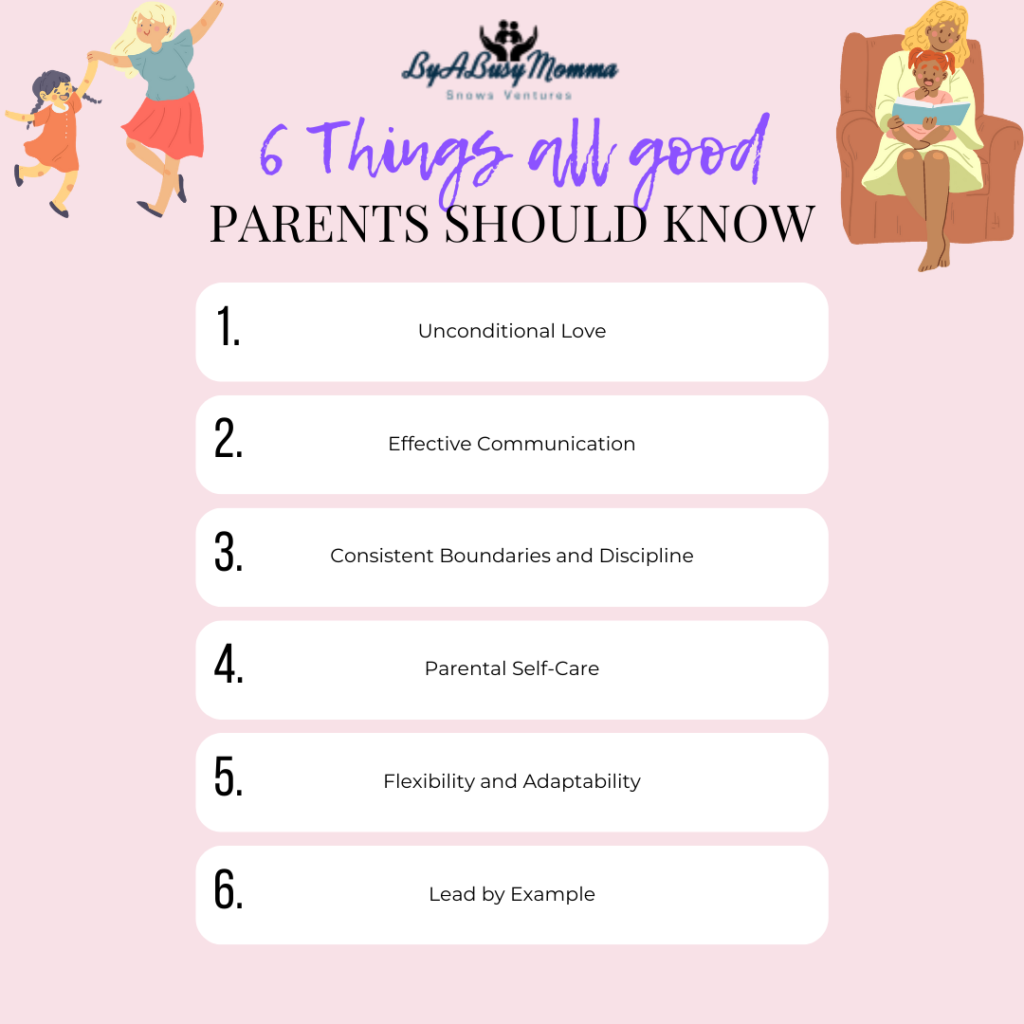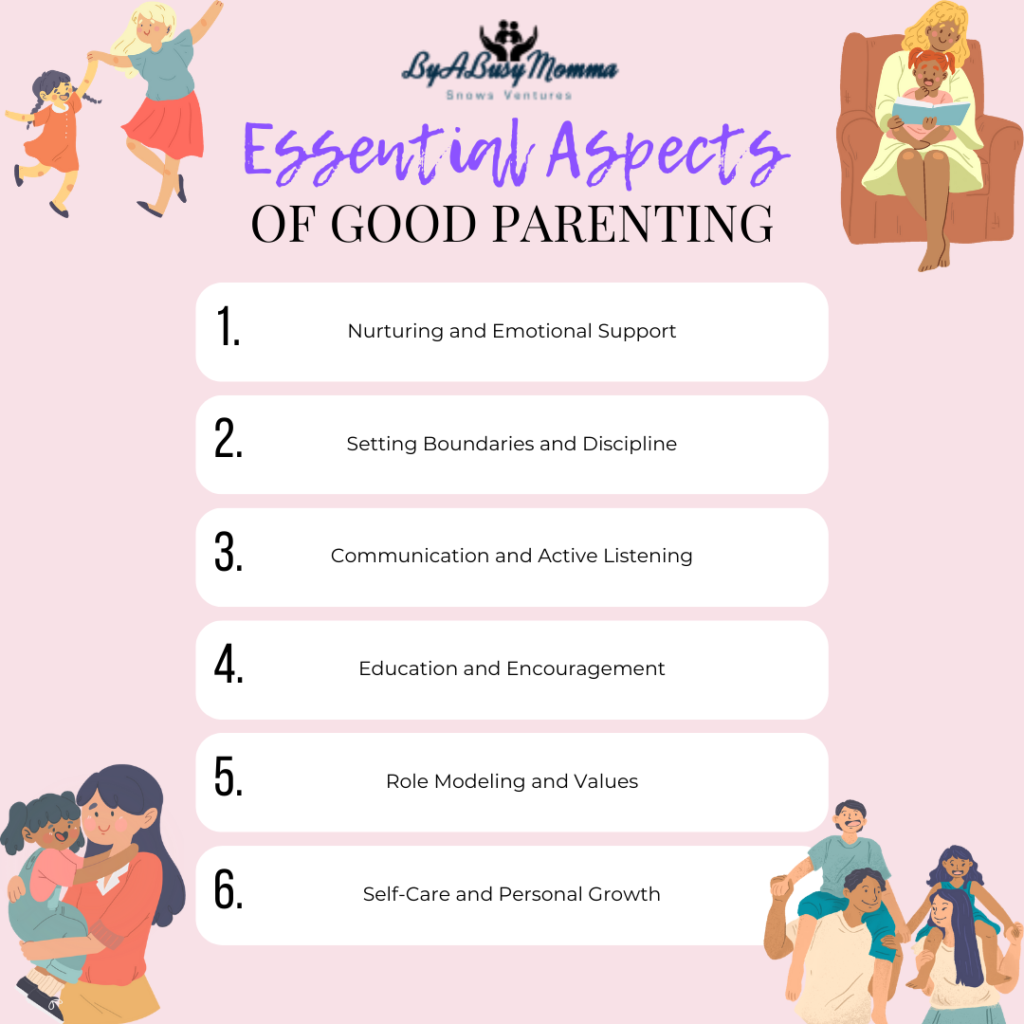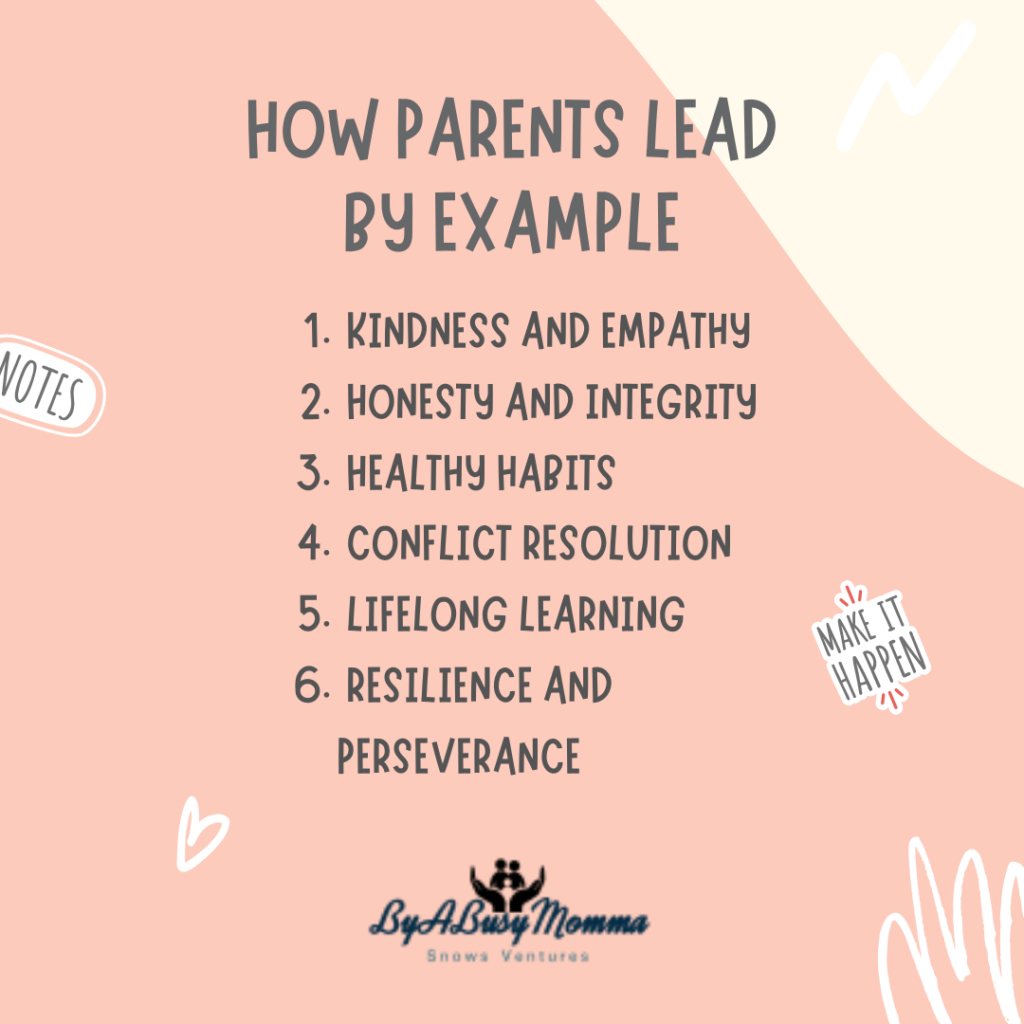While parenting is an individual experience, complex, and a learning journey, there are still some great things that a mom should consider as fundamental principles necessary for being a good parent. We will go over some of these principles in the paragraphs below; however, all moms and parents should consider the main point that love, communication, and leading by example are essential for being a good parent.
Here are also some great parenting books to pick up from Amazon:

Let’s dive deeper into six fundamental principles that most people would agree are essential excellent parents should know:
- Unconditional Love: Good parents understand the importance of unconditional love and acceptance to their children. This means loving and supporting your children regardless of their successes or failures and creating a safe and nurturing environment where they can thrive.
- Effective Communication: Good parents prioritize open and effective communication with their children. They actively listen, validate their children’s feelings, and encourage open dialogue. Effective communication helps build trust, strengthens the parent-child connection, and fosters a healthy relationship.
- Consistent Boundaries and Discipline: Setting clear and consistent boundaries is crucial for children’s development. Good parents set age-appropriate rules and guidelines and provide consistent discipline when crossing those boundaries. Discipline should be firm but fair, focusing on teaching and guiding rather than punishment.
- Parental Self-Care: Good parents recognize the importance of self-care. Taking care of your physical, spiritual, emotional, and mental well-being allows you to be more present and engaged with your children. When parents prioritize self-care, they model healthy behaviors and create a positive environment for the entire family.
- Flexibility and Adaptability: Parenting requires flexibility and adaptability. Good parents understand that every child is unique and that parenting strategies may need to be adjusted accordingly. They are open to learning and growing as parents, adapting their approach to meet their children’s changing needs and stages.
- Lead by Example: Good parents understand that their actions speak louder than words. They strive to be positive role models for their children, proving the values and behaviors they want to instill. By embodying kindness, empathy, honesty, and resilience, they inspire their children to develop these traits.
It’s important to note that there is no one-size-fits-all approach to parenting. Different parenting styles and strategies work as long as there is a fundamental building block of love and communication within the family. However, these six principles supply a foundation for many parents to build upon as they navigate their parenting journeys. While parenting can be approached in numerous ways, here are six additional categories to build upon that encompass essential aspects of good parenting:

Nurturing and Emotional Support: Good parenting involves providing children with a nurturing and emotionally supportive environment. This includes showing affection, expressing love, and creating a safe space where children feel valued and understood. Nurturing parents prioritize their children’s emotional well-being and provide comfort and reassurance during difficult times. Nurturing and emotional support are essential for a child’s healthy development. Good parents create a warm, loving environment where children feel safe, accepted, and valued. They offer physical affection, provide emotional support during challenging times, and actively listen to their children’s feelings and concerns. Parents help foster a strong parent-child bond and promote positive emotional well-being by being emotionally available and responsive.
Setting Boundaries and Discipline: Good parenting involves establishing clear boundaries and using appropriate discipline strategies. Setting boundaries helps children understand expectations and develop self-discipline. Effective discipline involves consistently enforcing rules, teaching consequences, and focusing on guiding behavior rather than punishment. Setting boundaries helps children understand limits, develop self-control, and learn appropriate behavior. Good parents establish clear and consistent age-appropriate rules and communicate them effectively to their children. They enforce these boundaries through appropriate discipline strategies focusing on teaching, guiding, and promoting positive behavior. Discipline should be fair, respectful, and aimed at helping children learn from their mistakes.
Communication and Active Listening: Good parenting emphasizes open and effective communication. It involves actively listening to children’s thoughts, feelings, and concerns without judgment. Encouraging open dialogue, asking questions, and providing guidance through conversations help build trust and strengthen the parent-child relationship. Effective communication is crucial for building trust and maintaining a healthy parent-child relationship. Good parents actively listen to their children, seeking to understand their thoughts, feelings, and perspectives. They create an open and non-judgmental space for children to express themselves. Parents convey their love, support, and guidance through regular conversations while encouraging their children to share their ideas, concerns, and experiences.
Education and Encouragement: Good parenting fosters a love for learning and supports a child’s educational journey. It involves providing educational opportunities, encouraging curiosity, and actively engaging in a child’s intellectual development. Good parents celebrate their children’s achievements and nurture and support them. Good parents prioritize their children’s education and academic development. They provide access to educational resources, promote a love for learning, and actively engage in their children’s educational journey. They support their children’s interests, help them explore new areas of knowledge, and celebrate their achievements. Good parents foster a growth mindset, encouraging their children to embrace challenges, persevere, and reach their full potential.
Role Modeling and Values: Good parenting involves being positive role models and instilling values in children. Parents lead by example, demonstrating honesty, respect, empathy, and responsibility. They communicate and reinforce their family’s values, guiding children in developing their moral compass. Parents are powerful role models for their children. Good parents exemplify the values they wish to instill in their children. They demonstrate honesty, integrity, empathy, respect, and responsibility in their actions and interactions. By consistently embodying these values, parents provide a solid moral compass for their children to follow. They also engage in open discussions about values, ethics, and decision-making to help children develop their sense of right and wrong.
Self-Care and Personal Growth: Good parenting recognizes the importance of self-care and personal growth for parents and children. Taking care of one’s spiritual, physical, emotional, and mental well-being allows parents to be more present and influential in parenting. Encouraging children’s personal growth and supporting their interests and aspirations are crucial aspects of good parenting. Good parents recognize the importance of self-care and personal growth for themselves and their children. They prioritize their well-being by caring for their spiritual, physical, emotional, and mental health. By doing so, they become more available and present to their children. Good parents also support their children’s personal growth, encouraging them to explore their interests, pursue hobbies, and develop their talents. They provide learning opportunities, expose their children to diverse experiences, and nurture their individuality.

These categories supply a framework for understanding several aspects of good parenting. Parenting is a complex journey; not all these strategies or approaches may work for your family, and others may function for your family instead. However, incorporating some strategies may increase your family’s and parent-child relationships’ well-being. Good parenting involves being responsive to your child’s unique needs and supplying a supportive and loving environment to help them thrive.
Here are some examples of how parents can lead by example and show positive behaviors for their children:

Kindness and Empathy: Parents can model kindness and empathy by treating others with respect and compassion. They can teach their children to be considerate by showing kindness to family members, friends, neighbors, and even strangers. Acts of kindness such as volunteering, helping others in need, or practicing random acts of kindness can also show the importance of empathy.
Honesty and Integrity: Parents can lead by example by being honest and truthful in their words and actions. When parents make mistakes, they can admit them and take responsibility, showing their children the importance of honesty and integrity. Parents teach their children the value of trustworthiness by keeping their promises and being reliable.
Healthy Habits: Parents can demonstrate the importance of a healthy lifestyle by practicing it themselves. This includes eating nutritious foods, exercising regularly, getting adequate sleep, and managing stress effectively. When children see their parents prioritizing their physical and mental well-being, they are likelier to adopt those habits.
Conflict Resolution: Parents can model practical conflict resolution skills by calmly and respectfully resolving conflicts within the family. They can demonstrate active listening, expressing emotions constructively, and finding mutually beneficial solutions. By doing so, they teach their children valuable skills for resolving conflicts in their own lives.
Lifelong Learning: Parents can foster a love for learning by being lifelong learners. They can demonstrate curiosity, engage in intellectual discussions, and pursue their interests and hobbies. When children see their parents valuing education and personal growth, they are more likely to develop a similar mindset.
Resilience and Perseverance: Parents can demonstrate resilience and perseverance when facing challenges and setbacks. They can share stories of their own experiences of overcoming obstacles and emphasize the importance of a positive mindset. By modeling resilience, parents teach their children to bounce back from adversity and persist in facing difficulties.

Remember, consistency is critical in demonstrating these positive behaviors. Children are highly observant and learn by observing and imitating their parents. When parents consistently exhibit these positive behaviors, they create an environment where such behaviors are valued and likely to be adopted by their children. Remember that these categories of good parenting are interconnected and influence one another. Good parenting involves a holistic approach considering the child’s spiritual, physical, emotional, intellectual, and social needs. Adapting and adjusting these strategies based on your child’s unique temperament, age, and developmental stage is essential. Parenting is an ongoing journey of learning and growth, and good parents continuously strive to improve their parenting skills and create a nurturing environment for their children.
